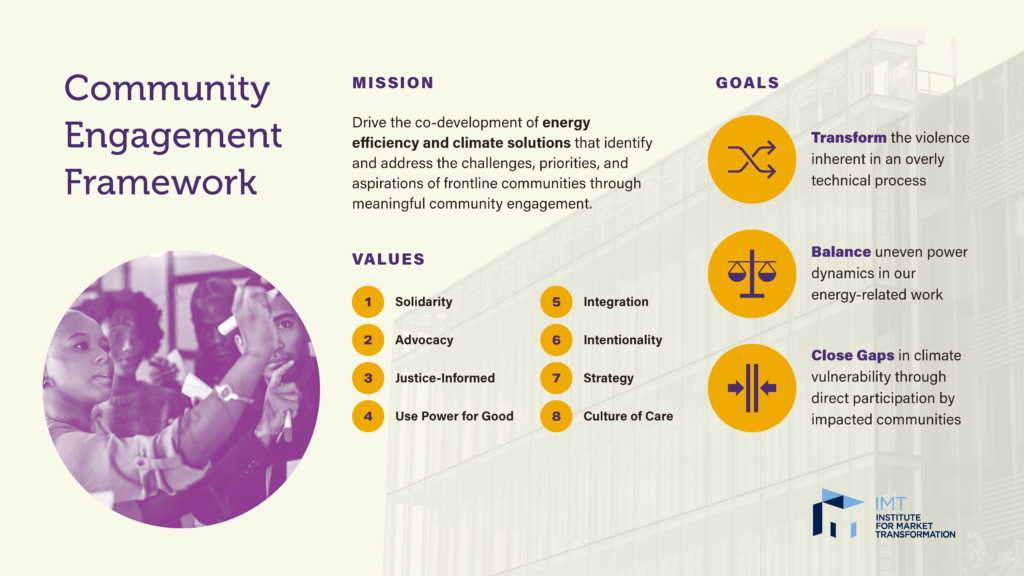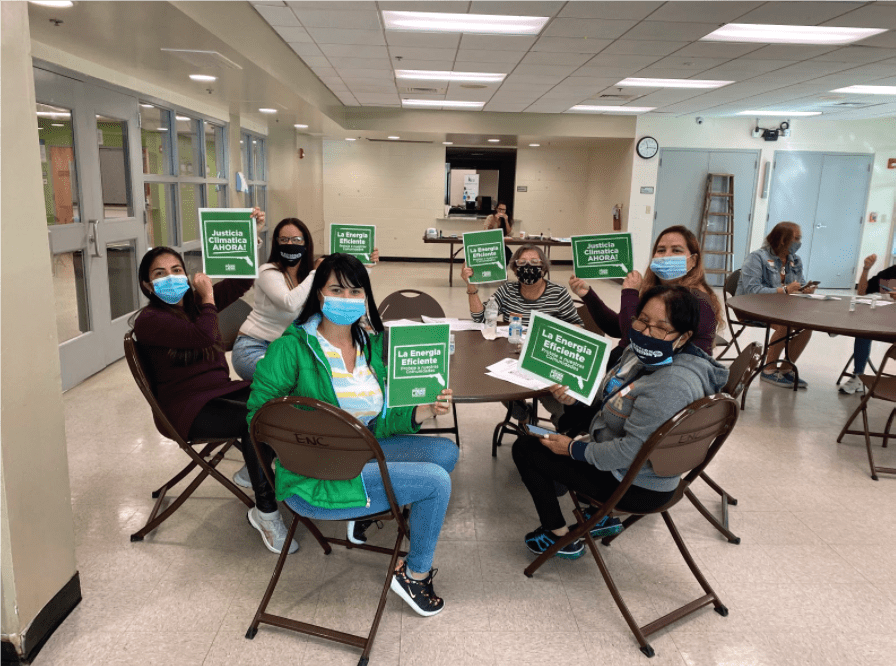Creating a New Practice
For more than 25 years, the Institute for Market Transformation (IMT) has worked hand-in-hand with policymakers to create and deploy building-focused legislation and codes that create momentum for greater building efficiency and performance. We specialize in policy approaches that raise buildings’ performance expectations with flexible paths to move forward, reflect the needs of industry stakeholders, support inclusive economic opportunity, and increase resiliency and health. Policies that IMT has helped design or implement now touch more than 10 billion square feet of commercial and multifamily space across the United States. However, too often, policy officials exclude frontline communities—those affected first and worst by climate change— from critical decisions, policies, and technical processes. This denies these residents the opportunity to share their knowledge and experience, provide consent, and fully participate in decisions that will affect their daily lives.
In June 2021, the Community Engagement (CE) team began developing the following framework for engaging communities throughout our work toward a resilient, low-carbon future. The team met over several months to research and establish a strategic plan for helping our governmental partners meaningfully engage with frontline communities. In addition, the Community Engagement Process Guide was created in February 2022 as a complementary resource to explain how we do this work, highlight best practices, ask critical questions for reflection, and list helpful resources related to climate change and environmental justice.

Mission
The mission for community engagement at IMT is to drive the co-development of energy efficiency and climate solutions that identify and address the challenges, priorities, and aspirations of frontline communities through meaningful community engagement.
Values
![]() Act in solidarity. Have empathy and humanize energy efficiency in a way in which everyone understands that these issues impact the livelihood of real people.
Act in solidarity. Have empathy and humanize energy efficiency in a way in which everyone understands that these issues impact the livelihood of real people.
![]() Advocate for transformative solutions. Make the case for cities, business leaders, and other stakeholders to collaborate with community.
Advocate for transformative solutions. Make the case for cities, business leaders, and other stakeholders to collaborate with community.
![]() Be justice- and issue-informed. Clearly understand the issues at hand about and the language we use so that we are intentional in our work.
Be justice- and issue-informed. Clearly understand the issues at hand about and the language we use so that we are intentional in our work.
![]() Use our power for good. Use our influence and resources to challenge the status quo systems that marginalize communities.
Use our power for good. Use our influence and resources to challenge the status quo systems that marginalize communities.
![]() Be intentional. Develop long term strategies for community engagement so that we aren’t rushed or stumbling in our steps.
Be intentional. Develop long term strategies for community engagement so that we aren’t rushed or stumbling in our steps.
![]() Be integrated. Clear communication between IMT staff on programs and projects, as well as clear communication between sectors and the Community Engagement team.
Be integrated. Clear communication between IMT staff on programs and projects, as well as clear communication between sectors and the Community Engagement team.
![]() Strategize before acting. Avoid shortcuts and prioritize research and planning before engaging with communities or making commitments to partners.
Strategize before acting. Avoid shortcuts and prioritize research and planning before engaging with communities or making commitments to partners.
![]() Foster a culture of care. Care for each other as colleagues first and foremost, so we can process and heal before engaging with others.
Foster a culture of care. Care for each other as colleagues first and foremost, so we can process and heal before engaging with others.
Goals
The CE team has outlined three major goals to help hold IMT accountable to shifting how the organization works with communities and governments:
- Transform. Make the policy-making process more accessible to communities at the national organization level and transform the slow violence that is inherent in an overly technical process.
- Balance. Make the policy-making process more accessible to communities at the national organization level and transform the slow violence that is inherent in an overly technical process.
- Close gaps. Close the gaps in climate vulnerability through direct participation of affected communities.



